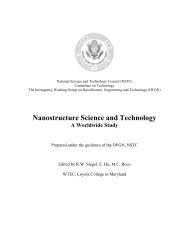Download - Nanowerk
Download - Nanowerk
Download - Nanowerk
Create successful ePaper yourself
Turn your PDF publications into a flip-book with our unique Google optimized e-Paper software.
• All products must respect legislation aimed at protecting and enhancing<br />
environmental quality and consumer protection. This could imply that non-medical<br />
implants or RFID chips introduced inside the body which are not safe should be<br />
forbidden. This raises the question of whether current legislation is adequate for<br />
regulating the use of sub dermal RFID chips for tagging people or for their use as<br />
an e-wallet?<br />
• In the research phase, a balance must be struck between academic freedom and<br />
responsible science and technology development. This is particularly sensitive for<br />
dual use technologies with civil as well as defence applications, requiring a new<br />
balance between openness and handling classified information.<br />
• The debate on relevant European legislation is continuing, especially on privacy<br />
and personal data protection. This discussion is clearly embedded in global<br />
discussions, e.g. in the OECD or in bilateral negotiations such as with the USA.<br />
The EU will in the coming years develop new rules for handling classified<br />
information in EU funded projects.<br />
5.3 Impacts on ethics and human rights<br />
To assess potential impacts of nanotechnology based security technologies on ethics and<br />
human rights, strategy documents discussing the aims and scope of European Security<br />
research policies are major sources of information. As nanotechnology based security<br />
technologies currently do not exist or are only just entering into the market of security<br />
technologies, the actual impacts on ethics and human rights can be observed only to a<br />
limited extent, e.g. in the case of RFID chips, which are currently being discussed in the<br />
European and national Parliaments, other policy making circles and the public. The<br />
following discussion should be considered preliminary and progress in the field should be<br />
monitored to identify emerging unforeseen impacts as soon as possible, enabling<br />
adequate policy making.<br />
5.3.1 Impacts of Security technologies<br />
In 2003 the EC engaged a Group of Personalities in the field of security research (Group<br />
of Personalities, 2003), who proposed priorities for European Security Research and the<br />
integration of civil and defence technology development activities of the EU and member<br />
states. 26 The Group of Personalities launched the concept of ‘Internal Security’ in Europe:<br />
“… a concept aimed at protecting citizens from threats like terrorism, organised crime,<br />
etc. The fundamental objective of ‘Internal Security’ is hence to protect the freedom and<br />
integrity of European citizens.” “Europe’s vision of security must … embrace a notion of<br />
‘Internal Security’ that can include a genuine feeling of well-being and safety for its<br />
citizens, while respecting its values of human rights, democracy, rule of law and<br />
fundamental freedoms.” The Group of Personalities believed in the benefits technology<br />
can bring to security: “Technology itself cannot guarantee security, but security without<br />
the support of technology is impossible”. This view is not without controversy and needs<br />
more corroboration than is offered.<br />
During the Nanoforum “Nanotechnology and Security” workshop, Dr Donald Bruce<br />
stressed the need to “suspend belief that innovation is always good”. Before deciding on<br />
developing any new security technology, the question should be asked whether there is a<br />
real need for the innovation. Do existing measures no longer suffice? (Morrison, 2007).<br />
Such an assessment of gaps in present security which require new technological solutions<br />
is lacking in the report from the Group of Personalities. The main motivation is the lower<br />
level of investment in security and defence technologies in Europe compared to the<br />
United States, and the lower efficiency in research spending due to a lack of cooperation<br />
between member states. There is no clear demand from the technology end users. To<br />
26 In this report, we can only discuss civil security aspects, leaving aside military applications.<br />
50

















